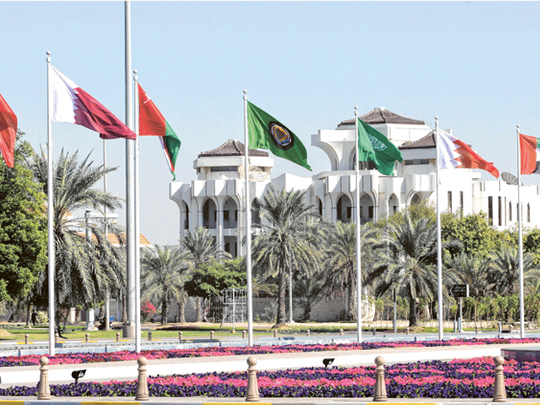
One of the key recommendations made in the 16th conference of the Emirates Centre for Strategic Studies and Research (ECSSR) was to turn the Gulf Cooperation Council into a confederation similar to the European Union.
Forming a confederation would allow the GCC to better face economic, political, cultural, and security related challenges, but time does not work in favour of the slow steps taken by the GCC's march towards integration and cooperation.
Unlike recommendations made by many Arab summits, this recommendation was not left unattended. A roadmap has been drawn up to achieve this goal, which has now become a necessity that suits the economic, political and security developments in the Arab world in particular, and the world in general.
A part of this roadmap calls for the importance of consolidating GCC citizenship and improving strategies, especially those related to the economy, which will effectively contribute to strengthening common interests and a sense of citizenship.
Moreover, there are still many requirements, which have been continually postponed, that have begun to create obstacles on the path towards a GCC common market.
Integration
Within this context, the GCC's strategic vision was based on grounds of improving local flexibility, and reconsidering the concept of national sovereignty, which if not discarded, will only hinder the success of any joint GCC action.
Recent events, such as the financial crisis, regional political tensions and attempts to possess nuclear weapons, call for speeding up the conference's recommendations for completing the Gulf economic integration, the setting up of a unified Gulf Armed Forces and a Court of Justice to resolve disputes.
These recommendations are important not only because of the rapid events occurring in the Arab world, but also the econ-omic and food crises that are sweeping the world, which the GCC countries will not be able to face individually.
Furthermore, the absence of laws and confederation systems endangers the progress reached in achieved economic and social benefits.
For the first time ever, such recommendations are gaining importance, considering that they were not made by any Gulf institutions, but by international observers and analysts that possess an unbiased third party perspective with strategic prospects.
The confederation system is considered a flexible system, and preserves for member countries their sovereignty in economic, political, military and financial affairs. However, it imposes general obligations on countries to maintain and develop collective gains of the confederation's members.
This in turn guarantees development and security for all member countries, as well as coordination in foreign and security affairs through which they can collectively face challenges within the framework of the confederation.
This contrasts with the federal system, which focuses its powers in federal bodies. Let's take for example the collective European response to the repercussions of the global financial crisis, which greatly reduced the severity of these repercussions.
Without this confederation, many European economies would have collapsed, which would in turn negatively affect not only all EU countries, but the world as a whole.
GCC countries, on the other hand, faced these repercussions individually, which left harmful effects on the GCC economy that can be seen in the difficulties facing Gulf bourses. This is at a time in which the EU bourses have overcome the repercussions of the crisis and have long regained their vitality.
Another important aspect is that some foreign powers have seized the absence of a confederation system to consider the security and military aid provided by Gulf countries to Bahrain as outside interference. This is despite the Gulf military agreements that allow such aid to be provided by the Peninsula Shield Force, which was established by all six member countries.
According to strategic analysis, it is clear that the world is on the verge of new economic, security and political systems, and the repercussions of such changes will not exclude any country or region as indicated by Colin Powell, former US secretary of state, during the conference. In particular, there are also new arrangements for the Middle East region, which needs preparation to avoid any surprises. This can be done by revising the concept of national sovereignty and changing into the Gulf confederation system.
Dr Mohammad Al Asoomi is a UAE economic expert.












